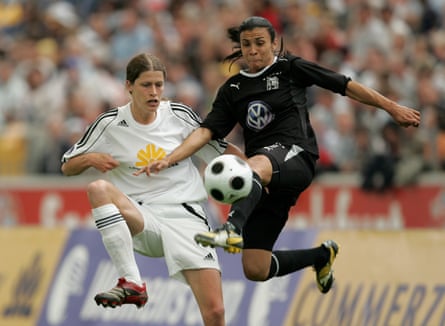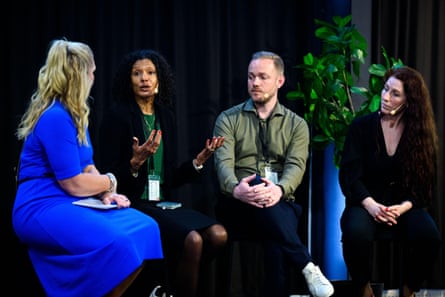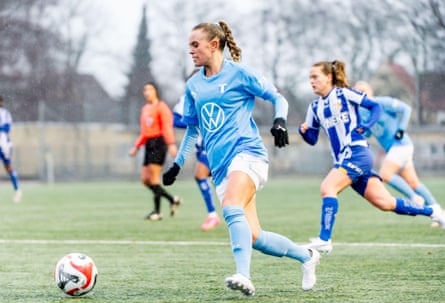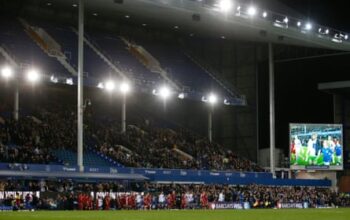The rain has let up in time for training and Malmö FF Women are going through their paces. Their session takes place at the club’s old ground but, on Saturday, their Elitettan campaign will begin yards away on the main Eleda Stadion pitch. It will be a special occasion: their first match in Sweden’s second tier after promotion, with about 2,000 fans looking on. They will face opponents who were once no strangers to a spot of glamour. Earlier this century few in Europe could rival Umeå IK, who won the Uefa Women’s Cup twice and were runners-up three times. Football has changed since their last final in 2008 and it would be a tremendous feat for any Swedish side, let alone Umeå, to hit those heights again.
While the players train, Håkan Wifvesson is wrapping up an intense day of discussion. “We, the Nordic countries, have been the strongest in the world,” says Wifvesson, chairman of Malmö’s city rivals and multiple top-flight title winners Rosengård, to a packed room inside the modern stadium. “I think we have to make a new plan for how we’re going to get back to that position.”
Everyone present agrees that women’s football in Scandinavia, Finland and Iceland sits at a crossroads. Clubs, associations and other stakeholders have gathered here at a conference organised by Malmö and Rosengård with the intention of plotting a new way forward for the sport in a region that once blazed a trail. Sweden and Norway, in particular, were once held up as the gold standard but they have been overtaken in many aspects. They were ahead of their time in developing it as a social, cultural force but bigger countries and economies have outstripped them, critically damaging their ability to compete.

The only Scandinavian club to have passed the quarter-finals of the Champions League, which succeeded the Uefa Women’s Cup, since 2009-10 is Sweden’s Tyresö, who reached the final in 2014 but went bankrupt in the same year. Although Sweden have reached five World Cup or European Championship finals and Norway eight, none of those appearances have come since 2013. Only Denmark, less heralded but runners-up at Euro 2017, have struck a blow for the area since then. The Danes have bid to co-host Euro 2029 with Sweden and all involved would rather show off a healthy sport.
Lise Klaveness, the Norwegian football federation president, is among those addressing delegates at Eleda. “We have to fix the basics,” she tells a panel that also includes the former Rosengård and current Arsenal manager, Jonas Eidevall. Afterwards she argues that the region must retain its points of difference while propelling itself into a new era.
“This is a very important point in time for us,” she tells the Guardian. “We were early to develop and now we shouldn’t give up; we need to get on the train because we’ve been in the station for 50 years. I really believe our Nordic values of club structure, of grassroots, can be profitable but we risk being left behind while innovation happens elsewhere.”
The need for investment is a recurring theme of the day, Eidevall among those stressing its urgency. Since the traditional powers of the men’s game in England, Spain and France, to name three, began ploughing funds into their women’s branches the financial disparity has become stark. Clubs in Sweden and Norway are majority owned by their supporters, which adds an extra risk factor for potential investors. A sacrosanct democratic strength can also be viewed as a hindrance but some sense the profile of women’s football is changing perceptions.

“We have companies in our sponsorship that wouldn’t be here if we didn’t have a women’s team,” says Niclas Carlnén, thechief executive of Malmö. “I can see that it’s one of the decision points when they renew their contracts. It isn’t as simple as putting men’s money or women’s money in: you need a holistic view of the club and what you stand for, which is what sponsors invest in. Then I think it’s sustainable.”
Klaveness sees further hope in the fact the Norwegian club Brann, who reached this year’s Women’s Champions League quarter-finals, can tell a similar story of attracting lucrative sponsorships through commitment to equality. There is a consensus that such funds should be spent on development and facilities rather than attempts to lure expensive foreign stars back. The days of Marta, formerly of Umeå and Rosengård, gracing the Damallsvenskan and its peers may be long gone but banking on the Nordics’ unique advantages may reap longer-term benefits. “We can invest in infrastructure and create humans,” suggests Rikke Rønholt, a panellist and board member of the Denmark National Olympic Committee. “What if our strength was that our players are just smarter and more mature all round?”
Participation among girls is little problem but pathways to a career, whether in playing or coaching, tend to be inadequate and the attrition rate between 16 and 19 remains high. The talent still exists in spades: Nordic players have taken with ease to the levels set by clubs such as Chelsea and Barcelona, for whom the Sweden international Fridolina Rolfö scored last year’s Champions League winner. Deepening the pool of intelligent players who can make a living domestically, though, remains an aspiration.
after newsletter promotion
Klaveness hopes the conference breeds formal collaborations between the countries and, perhaps, an agreement to make better use of each other’s talent pools. “We should preserve our sustainability but also rock the boat a bit,” she says. “We need innovation, energy, tension also. Our market is not big and we need to grow it.”

Carlnén has big plans for Malmö. The history of women’s football in the city is complex: Rosengård, for whom he was once goalkeeper coach and later became CEO, were formed from Malmö Women’s first incarnation. Malmö, the current men’s champions, created a new women’s section in 2019: its members voted to rise through the divisions rather than subsume another local club. They have done so without losing a game and it is a matter of time before they are competing with Rosengård in the top flight, trading blows in a derby that should further stoke local interest. “We have the same vision as our men’s club: to be the best in Sweden, one of the leading clubs in the Nordics and established in Europe,” he says.
No one here believes a magic wand will reverse the trend that has accelerated over the past decade. There are voices in the room who see times getting tougher; those who think the best case scenario is for clubs to establish themselves as viable player traders in preparation for the day when large transfer fees become commonplace. Klaveness, a Uefa Women’s Cup runner-up as a player with Umeå in 2007 when Alex Scott scored a dramatic winner for Arsenal, sees the difficulties but believes a relentless tempo can bring history to repeat itself.
“When you see the economies of the countries who are now going all in, you cannot say we will have Champions League winners from the north every year,” she says. “But I think it’s very realistic that we can be a challenger. If we have that visionary, strategic desire to lift Nordic football, we can be a player again.”
Source: theguardian.com


